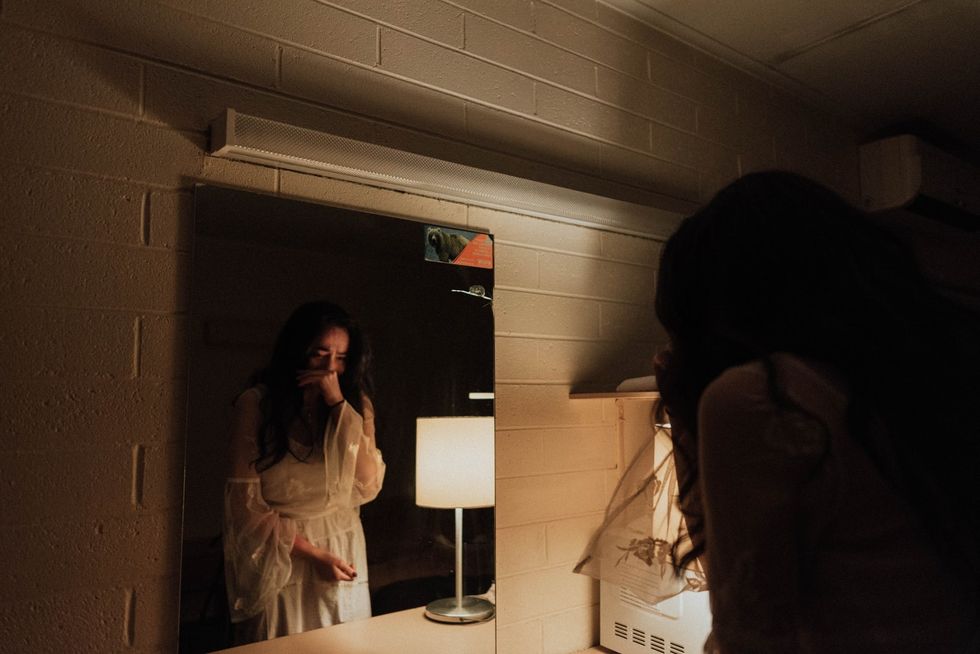As someone with a history of an eating disorder, my journey with body dysmorphia began at a much younger age than I originally recognized. After consulting with numerous therapists and doctors, I realized that this was a condition I have likely been suffering from since the first time I stepped in front of a mirror.
For those who don't know, body dysmorphia is a mental illness that leads an individual to be consumed with thoughts of their own flaws. For some people, this can mean focusing on a certain feature of their face, their overall body shape, anything about their physical appearance that they are extremely unsatisfied with. Over time, the perceived flaw begins to morph into something more extreme than what it realistically is, so someone who suffers from BDD does not truly know what they look like. When they glance at their reflection, all they can see is this certain flaw. They often find themselves worried that other people are staring at this supposed imperfection and seek constant reassurance from others.
Personally, my body dysmorphia causes the image I see in the mirror to be completely warped. During the most detrimental years of my eating disorder, I could not recognize how my body truly looked. All I saw was an overweight girl, the chubby kid I grew up staring at in the mirror. Even as I got older — even as I lost more weight — that same image still appeared. I could not understand why my clothes were too big for me if I was, from my perspective, as fat as I always had been and believed I always would be.
Once I embarked on my recovery process, I slowly began to grasp onto the reality of my appearance.
I started to understand how underweight I became and was shocked to see photos of me before I had been hospitalized for malnourishment. Although gaining weight after treatment was difficult, I felt like I could finally see the real me.
Unfortunately, despite the progress I had made physically, I soon learned that my body dysmorphia was something separate from my eating disorder. My health care professionals informed me that, based on my symptoms, my BDD was not something that developed as a result of anorexia. It was something I had been facing for much longer, quite possibly since elementary school.
Receiving a diagnosis of body dysmorphia helped in some aspects. It was comforting to know that this was something I did not make up in my head, but instead, something that many people, both with and without a history of eating disorders, suffer from.
As time went on and I continued into my undergraduate career, I learned to use coping mechanisms to face my body dysmorphia. The image I saw may not have been reality, but now I knew this and could treat myself with the kindness I deserved. I was not the fourth-grade girl with the protruding stomach that stared back at me in the mirror. I did not have to be scared that was all anyone else could see.
Once my classes went online due to the global pandemic and I was forced to return home for the duration of the semester, I found myself losing the skills I worked so hard to gain. With all the time in the world to scroll through social media, skinny girls showing off their at-home workout routines seemed to taunt me. My feed became a toxic mix of "quarantine diets" and ab exercises that were aimed to keep people slim during this time of isolation.
Fitness gurus on every online platform spewed fat-shaming rhetoric that immediately brought me back to a mindset I never wanted to be in.
I knew I was gaining weight in quarantine and kept myself accountable for any intrusive thoughts that came up. Even though I was taking care of my physical health in a way I knew I should, I found myself avoiding all mirrors during the day and being on the verge of a breakdown whenever I changed outfits. It felt like I was once again looking at my younger self, but with even stronger hate towards the reflection. In my mirror, I saw myself continue to grow and grow until I was convinced that I had become a monster. I was no longer me, I was just some blown up figure.
As quarantine continues (and will inevitably go into the summer), I am now constantly on the look-out for my symptoms of BDD. I can no longer allow them to cripple me, to leave me hopeless and broken at the end of every day. Looking at the mirror is still hard. Seeing the clothes I no longer fit into can lead me to a spiraling session, and there are days when I feel overwhelmed with bad body image thoughts.
There are moments when I convince myself I am no longer me, but I know I can always come back to my truth. I constantly tell myself every day that I am worthy, that the reflection does not define who I am. Whether or not I can recognize how my body looks does not lessen my beauty and worth. If I cannot see my authentic self, I must tell myself what the image in the mirror cannot say: I am beautiful, I am strong, and I will not let my dysmorphia control me.
If someone you know is struggling with body dysmorphia or if you simply want to learn more about the condition, please consider calling the OWH Helpline at 1-800-994-9662.

















